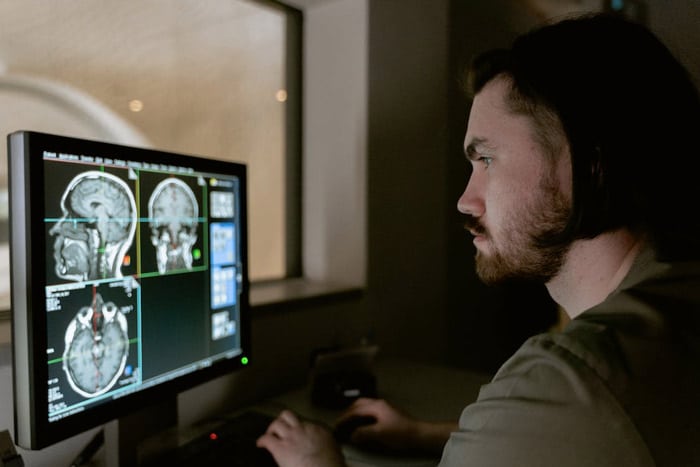
This post provides exhaustive information on the nuclear medicine technologist education and career, including the requirements you need to meet to become a nuclear medicine technologist.
Who is a Nuclear Medicine Technologist?
A nuclear medicine technologist is a healthcare professional who performs nuclear imaging tests to diagnose disease in the body.
These tests are used to help doctors find tumors, heart problems, infections, and other conditions that may be causing symptoms such as pain or discomfort.
Why Choose Nuclear Medicine Technologist Career?
The career of a nuclear medicine technologist can be very rewarding. The reasons for this include:
- You’ll work with patients who need your skills to detect diseases and abnormalities.
The job also offers many opportunities for advancement and growth. If you choose this field, you’ll have an opportunity to learn new techniques and technologies, which could lead to higher pay and better benefits.
2. A nuclear medicine technologist has a good chance of being able to save lives.
This is because they perform diagnostic procedures that allow doctors to see inside the body without having to cut it open.
They can use these tests to determine if there is something wrong with organs or tissues.
3. There are lots of different types of jobs available to you when you become a nuclear medicine technologist.
Some positions involve working alone while others require teamwork. You might even be asked to teach others how to do some of the tasks you learned.
4. Many people enjoy the variety of responsibilities associated with this type of career.
For example, you might work at a hospital, clinic, private practice, school, or research lab.
5. Nuclear medicine technologists earn high salaries.
According to the Bureau of Labor Statistics (BLS), the median annual salary for all nuclear medicine technologists was $79,5790 in May 2020.
In addition, the BLS reported that the average hourly wage was $24.90 per hour.
Nuclear Medicine Technologist Education Requirements
To qualify for entry-level employment as a nuclear medicine technologist, you must meet certain educational requirements.
Here are the minimum education levels required by the U.S. Department of Health & Human Services (HHS):
- An associate’s degree from a college or university that is accredited is required.
- Bachelor’s degree from an accredited college/university or 2 years of experience equivalent to graduation from an accredited college/ university
- Master’s degree from an accredited institution
- Doctoral degree from an accredited institution.
Nuclear Medicine Technologist Continuing Education
Every year, nuclear medicine technologists must complete continuing education courses to keep their licenses active.
These courses vary depending on where you live, but most states require that you take one course every two years.
To stay current with technology and methods, you should enroll in classes related to the following topics:
- Medical physics
- Radiopharmaceuticals
- Radioisotopes
Nuclear Medicine Technologist Certification/License
In order to get licensed as a nuclear medicine technologist, you will need to pass a certification exam.
Most states offer licensing exams that test your knowledge of medical terminology, anatomy, physiology, pathology, and pharmacology.
You may also need to pass a background check before you are allowed to apply for licensure.
Nuclear Medicine Technologist Career Pathways
There are several career pathways for nuclear medicine technologists. The most common careers include:
- Diagnostic radiologic technologist
The job duties of a diagnostic radiologic technologist include performing X-ray imaging, CT scans, MRIs, ultrasounds, and other diagnostic examinations.
2. Managerial radiologic technologist
A managerial radiologic technologist is responsible for overseeing the operation of a radiology department.
This includes scheduling appointments, ordering equipment, and training staff.
3. Radiation safety officer
Radiation safety officers ensure that patients receive proper doses of radiation during procedures such as X-rays and CT scans.
They also monitor radioactive materials used in hospitals and clinics.
4. Clinical laboratory technician
Clinical laboratory technicians perform tests on blood samples to determine if someone has any diseases.
They also prepare specimens for testing and analyze results.
5. Nuclear medicine technologist
Nuclear medicine technologists work at outpatient centers, hospitals, and research facilities.
Their primary responsibility is to administer radioactivity to people who have been diagnosed with cancer.
Others include:
- Nuclear medicine technician
- Radiation therapist
- Nuclear medicine physician
- Clinical assistant professor
- Research scientist
- Biomedical engineer
How to Advance your Nuclear Medicine Technologist Career
To advance your career as a nuclear medicine technologist, here are some suggestions:
- Take online courses to learn new skills. Courses can be taken through schools or private companies.
- Join professional organizations. These groups provide opportunities to network with others and share ideas about how to improve your profession.
- Attend conferences. Conferences allow you to meet experts from different fields and exchange information.
- Network with colleagues; interact with them and find out what they do.
- Learn more about the field by reading books and articles.
How to Find a Good Nuclear Medicine Technologist School
If you are looking for a good nuclear medicine technologist but don’t know where to start, here are some tips:
- Research the school’s accreditation status. Accredited schools must follow certain standards.
- Check the school’s website to see whether it offers scholarships.
- Contact the school directly to ask about its programs and tuition costs.
- Consider visiting the campus. If you like the area, this might help convince you to attend the school.
- Look into the school’s reputation. It should be accredited and recognized by the American Registry of Radiologic Technologists (ARRT).
- Do not choose a school based solely on its location.
- Choose a school that provides hands-on experience.
Many students prefer to take classes in their hometown because they want to stay close to family members. However, this may not be possible when choosing a school.
- Be sure to check the school’s curriculum. You will need to complete specific coursework before becoming certified.
- Check the school’s alumni reviews. Alumni often give feedback about the quality of education and job placement after graduation.
How to be Successful in your Nuclear Medicine Technologist Career
If you desire success in your career as a nuclear medicine technologist, these are ideas to consider:
- Become familiar with the equipment. This includes knowing how to operate the machine and safely handle radioactive material.
- Understand the dosages involved. Know how much radiation each procedure gives off.
- Maintain an open mind. Stay curious and keep learning. Keep asking questions and seeking advice.
- Be patient. The process of getting trained takes time. Be willing to put in extra hours if necessary.
- Follow procedures carefully. Make sure you understand the steps required before performing any task.
- Practice safe work habits. Always wear protective gear such as gloves, masks, and aprons. Wear eye protection during procedures.
- Be honest. Tell supervisors if you have problems understanding instructions.
What Does a Nuclear Medicine Technologist Do?
A nuclear medicine technologist is responsible for operating medical imaging machines.
They perform tests to diagnose diseases and injuries. A typical test involves injecting a small amount of radioactive material into the body.
Then, the technologist uses special cameras to view the results.
The following are examples of common tests performed by nuclear medicine technologists:
- Bone Scanning – Used to detect bone cancer or other bone disorders.
- CT Scans – Used to detect tumors, blood clots, and other conditions.
- PET Scans – Used to identify areas of high metabolism and abnormal growth.
- SPECT Scans – Used to locate organs that produce hormones.
- Ultrasounds – Used to examine internal structures.
- X-rays – Used to detect broken bones, foreign objects, and other abnormalities.
- Other Tests – These include mammograms, colonoscopies, and others.
Qualities of a Good Nuclear Medicine Technologist
Here are qualities that make an excellent nuclear medicine technologist:
- Knowledgeable – Have knowledge of the equipment used in testing.
- Patient – Are able to listen to patients without being judgmental.
- Honest – Speak honestly to patients and supervisors.
- Responsible – Take responsibility for mistakes made while working.
- Creative – Use imagination to solve problems.
- Dedicated – Work hard to achieve goals.
- Respectful – Treat people with respect.
- Flexible – Adapt well to changing situations.
- Self-motivated – Set goals and work toward them.
- Organized – Keep files and records up to date.
Nuclear Medicine Technologist Salary
The base income for a nuclear medicine technologist ranges from $78,238 to $95,241, with an average base compensation of $87,057, according to salary.com.
Nuclear Medicine Technologist Job Outlook
According to the US Bureau of Labor Statistics, employment of nuclear medicine technicians is expected to expand at a rate of 8% between 2020 and 2030, which is approximately the same as the national average for all occupations.
On average, 1,500 opportunities for nuclear medicine technologists are expected per year during the next decade.
Conclusion
If you want to become a nuclear medicine technologist, then you should know the kind of education that is required.
This article has provided the nuclear medicine technologist education pathway you can follow to actualize your dream of getting into the career.
You will need to complete some courses to earn your Associate’s degree. After completing this program, you may be eligible for admission to a four-year college or university.
The most important thing to remember when applying for this program is to keep focused on what you really want to do.












